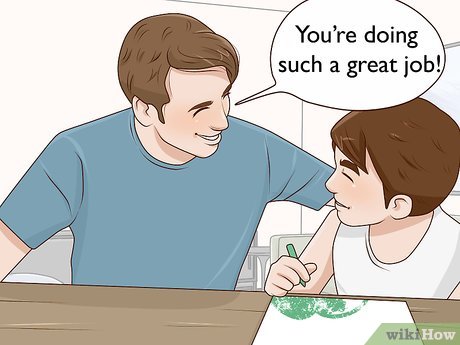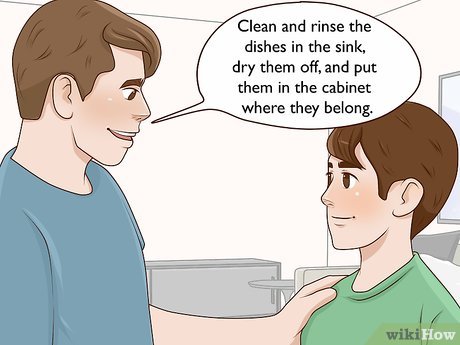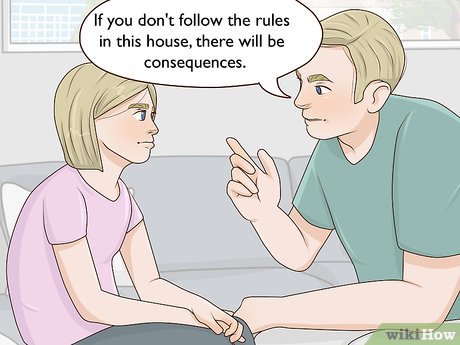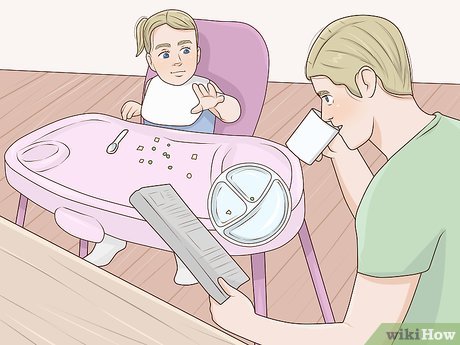How to Be a Positive Parent
Building a Positive Character
-
 Be a good role model for your children. Your kids naturally watch you and repeat your behavior. If you model good behavior for them, then they're more likely to pick up good habits. Behave the way you'd like your children to behave and show them the qualities you want them to have. This modeling behavior gives your children an example of the right ways to act.[1]
Be a good role model for your children. Your kids naturally watch you and repeat your behavior. If you model good behavior for them, then they're more likely to pick up good habits. Behave the way you'd like your children to behave and show them the qualities you want them to have. This modeling behavior gives your children an example of the right ways to act.[1]- One way to tell if you're being a good role model is asking yourself if you'd be happy with your kids acting the way you're acting right now. If the answer is no, then adjust your behavior to something you'd be happy with your kids repeating.
- This carries over to behavior that isn't necessarily aggressive. For example, if you tell off-color jokes often and your child laughs, you might think you're doing a good job connecting with them. But then they may get in trouble for telling those jokes in school. You were modeling poor behavior for the child.
-
 Schedule quality time with your child throughout the day. Quality time is a very important part of positive parenting, and children sometimes act out if they feel neglected. Do your best to find time throughout the day to spend time with your kids. This doesn't have to be a lot of time. Even an extra few minutes each day could make the difference between your child feeling satisfied and feeling neglected.[2]
Schedule quality time with your child throughout the day. Quality time is a very important part of positive parenting, and children sometimes act out if they feel neglected. Do your best to find time throughout the day to spend time with your kids. This doesn't have to be a lot of time. Even an extra few minutes each day could make the difference between your child feeling satisfied and feeling neglected.[2]- Try to eat one meal a day together, if you can. This may not seem like a lot of time, but it brings you and your children together on a regular schedule.
- A scheduled family night each week is a good way to provide regular attention. Watch a movie or play a game with your whole family to spend some quality time together.
- If your child is a teenager, they may want less regular time with their parents, which is normal. But if they do express a desire to talk or spend time with you, make the time as soon as you can. Don't reject their need for attention.
-
 Compliment your child for good behavior. Parents sometimes only react when their child misbehaves. Over time, this teaches the child that they get attention for bad behavior. Flip the dynamic and catch your child doing good things. Praise, compliment, and thank them for their good behavior. This teaches the child that they get more attention for being good and discourages bad behavior.[3]
Compliment your child for good behavior. Parents sometimes only react when their child misbehaves. Over time, this teaches the child that they get attention for bad behavior. Flip the dynamic and catch your child doing good things. Praise, compliment, and thank them for their good behavior. This teaches the child that they get more attention for being good and discourages bad behavior.[3]- If your child is sitting quietly coloring, say, 'You're doing such a great job! Thank you for being so good.'
- Also praise the way your child interacts with friends or siblings. Say, 'You played with your sister very nicely before, that was very nice of you.'
- This works for older children as well. For example, thank your teenage son for doing a great job cleaning his room without being asked.
-
 Assign your child household tasks to build responsibility. Introduce chores early on so your child develops a work ethic. Start slow. When your child is 2 or 3, tell them they have to put their toys away after they play. When your child is around 5, introduce more tasks like putting their cups and dishes in the sink, bringing in the mail, clearing the table, and other simple activities. Work up to larger tasks gradually. By the time your child is a teen, they should have developed a work ethic through doing household chores.[4]
Assign your child household tasks to build responsibility. Introduce chores early on so your child develops a work ethic. Start slow. When your child is 2 or 3, tell them they have to put their toys away after they play. When your child is around 5, introduce more tasks like putting their cups and dishes in the sink, bringing in the mail, clearing the table, and other simple activities. Work up to larger tasks gradually. By the time your child is a teen, they should have developed a work ethic through doing household chores.[4]- Early on, have your child help you with household tasks like simple cleaning or setting the table. This teaches them chores while also letting you spend quality time together, satisfying both needs.
- Give specific instructions for chores so your child doesn't get confused. 'Wash the dishes' is a little vague, and doesn't specifically tell your child what to do. Instead, tell them to, 'Clean and rinse the dishes in the sink, dry them off, and put them in the cabinet where they belong.'
- Experts generally recommend not paying your children for chores because the point is teaching responsibility and work ethic. If your child is older, however, an allowance could be a good way to convince them to pick up more chores than usual.[5]
-
 Teach your child compassion for other people. Caring for other people is a very important part of being a positive person. Start early on and teach your children that there are other people in the world who face their own challenges.[6]
Teach your child compassion for other people. Caring for other people is a very important part of being a positive person. Start early on and teach your children that there are other people in the world who face their own challenges.[6]- Model compassionate behavior for your children. Don't lose your temper with people or call them names. Always be kind and calm to show your children a positive way to interact with people.
- Correct your child if they say something insensitive. For example, if they say, 'That man seems really grumpy,' say, 'You don't know what he's going through. He could be having a bad day.'
- If your child is older, encourage them to do some volunteer work, or do it with them. This can show them how other people live and why they should have empathy.
Encouraging Your Child's Independence
-
 Praise your child's accomplishments to boost their self-esteem. If your child has a good sense of self-esteem, they'll be more comfortable branching out and taking on more responsibilities. Build their self-esteem by praising their efforts and accomplishments. Always let them know that you're cheering for them.[7]
Praise your child's accomplishments to boost their self-esteem. If your child has a good sense of self-esteem, they'll be more comfortable branching out and taking on more responsibilities. Build their self-esteem by praising their efforts and accomplishments. Always let them know that you're cheering for them.[7]- Compliment your child's efforts more than their accomplishments to encourage them to work hard. If they show you a painting from school, say, 'I'm proud that you worked really hard on this.'
- Don't overpraise or your child will sense that your compliments are fake. For example, if they strike out 3 times in a little league game, don't say, 'You had a great game,' because that wouldn't be true. Say 'I'm proud that you didn't give up.' This is more realistic praise.
-
 Let your child choose an activity you do together. This is an easy way to get your child used to making decisions. Ask them to choose an activity the two of you will do together. This makes them feel like they're in control while teaching them more independence. As a bonus, it gives you quality time together through the activity.[8]
Let your child choose an activity you do together. This is an easy way to get your child used to making decisions. Ask them to choose an activity the two of you will do together. This makes them feel like they're in control while teaching them more independence. As a bonus, it gives you quality time together through the activity.[8]- If your child has trouble making a decision, give them a choice between 2 activities. Say, 'Would you like to read a book or play cards?' When they choose between the 2, they'll still feel like they made an independent decision.
-
 Encourage your child to play with other children. This teaches your child to socialize, share, and make friends. These are all important skills for life. Don't hover you're your child while they're playing with other kids. Unless they're doing something dangerous, let them develop games and activities to foster their independence.[9]
Encourage your child to play with other children. This teaches your child to socialize, share, and make friends. These are all important skills for life. Don't hover you're your child while they're playing with other kids. Unless they're doing something dangerous, let them develop games and activities to foster their independence.[9]- If your child is in school, talk to other parents and arrange play dates to have your child meet other kids.
- Take your child to the park where other kids are and let them play in a group.
-
 Help your child learn new skills. Learning new skills is a great way to foster your child's independence, and sets them up to learn other skills on their own later on. Introduce your child to new skills slowly and help them along at first. Then, when they improve, let them do the activity alone. This builds their independent thought.[10]
Help your child learn new skills. Learning new skills is a great way to foster your child's independence, and sets them up to learn other skills on their own later on. Introduce your child to new skills slowly and help them along at first. Then, when they improve, let them do the activity alone. This builds their independent thought.[10]- Try to encourage things that your child shows an interest in. If they seem fascinated by cars, for example, get them a small book about cars so they can learn more.
- If you have a hobby or a skill, include your child so they can learn. If you play guitar, let your child watch and play along. Work up to letting them play themselves.
- Don't pressure your child to learn new skills. This should be fun and improve their self-esteem, not a stressful experience.
Disciplining Your Child Fairly
-
 Make clear rules and consequences for bad behavior. Positive parenting doesn't mean you'll never discipline your child. It means that the discipline is fair and consistent. Start by outlining a clear set of rules so your child knows exactly what isn't allowed. Then, outline what the consequences are if your child breaks the rules. This sets up clear boundaries so your child knows what proper behavior is.[11]
Make clear rules and consequences for bad behavior. Positive parenting doesn't mean you'll never discipline your child. It means that the discipline is fair and consistent. Start by outlining a clear set of rules so your child knows exactly what isn't allowed. Then, outline what the consequences are if your child breaks the rules. This sets up clear boundaries so your child knows what proper behavior is.[11]- Make sure the punishments are consistent with the infractions. For example, grounding your child for a week if they forget to put a dish away is a little harsh. A better punishment would be that they can't play video games for the evening.
- If you do make clear rules and consequences, make sure you stick to them. If you tell your child they'll lose their phone if they don't clean their room but then don't take the phone away, you've taught your child that they can ignore you and face no consequences.
-
 Ignore bad, attention-seeking behavior instead of yelling. Younger children especially sometimes do things just to get attention. If you react and start yelling every time they do something, you're reinforcing that behavior. Recognize attention-seeking bad behavior, and ignore it instead of reacting. This maintains a peaceful atmosphere and also gradually discourages the behavior.[12]
Ignore bad, attention-seeking behavior instead of yelling. Younger children especially sometimes do things just to get attention. If you react and start yelling every time they do something, you're reinforcing that behavior. Recognize attention-seeking bad behavior, and ignore it instead of reacting. This maintains a peaceful atmosphere and also gradually discourages the behavior.[12]- Toddlers sometimes knock plates off the table. If you get mad and put it back each time, your child could think it's a game. The next time they knock the plate over, don't react and leave it on the floor. Your child will eventually see that the activity doesn't get a response from you.
- A positive way to encourage good behavior is praising your child for being behaving well. This shows them that they get more attention from good behavior, and will focus less on attention-seeking behavior.
-
 Be consistent when you discipline your child. Inconsistent discipline will leave your child confused and unsure of the rules. If you ignore something 5 times but start yelling and punish the child on the 6th time, your child may not know what they did wrong. If you've set a rule, then discipline your child every time they break it. Maintaining this consistency shows your child that they can't manipulate you.[13]
Be consistent when you discipline your child. Inconsistent discipline will leave your child confused and unsure of the rules. If you ignore something 5 times but start yelling and punish the child on the 6th time, your child may not know what they did wrong. If you've set a rule, then discipline your child every time they break it. Maintaining this consistency shows your child that they can't manipulate you.[13]- If you do ignore something a few times, give your child a warning instead of suddenly blowing up. Say, 'Next time you do that you're losing your phone.' This sets a clear boundary that your child can't pass without consequences.
-
 Explain to your child why their behavior was inappropriate. As a parent, coach your children instead of just punishing them. If they break a rule or behave badly, sit them down and explain what they did wrong. Tell them why that behavior was inappropriate and how they can fix it. This way, your child will learn something from the situation.[14]
Explain to your child why their behavior was inappropriate. As a parent, coach your children instead of just punishing them. If they break a rule or behave badly, sit them down and explain what they did wrong. Tell them why that behavior was inappropriate and how they can fix it. This way, your child will learn something from the situation.[14]- If your child is having a tantrum or is angry, wait until they calm down before explaining the situation. The same goes for you. If you're angry and can't have a calm conversation at the moment, wait until later.
-
 Have age-appropriate expectations for your child. Having unrealistic expectations of your children can frustrate you and stress your child. Take their ages into account and ask yourself if you're expecting too much of them. If you expect them to solve problems like an adult when they're too young to have those skills, then you'll end up disappointed. Adjust your expectations to fit the reality of your children's development levels.[15]
Have age-appropriate expectations for your child. Having unrealistic expectations of your children can frustrate you and stress your child. Take their ages into account and ask yourself if you're expecting too much of them. If you expect them to solve problems like an adult when they're too young to have those skills, then you'll end up disappointed. Adjust your expectations to fit the reality of your children's development levels.[15]- For example, it's wrong to expect a 5-year old to clearly articulate their feelings. They don't have the skills or vocabulary to do that. So they may act out in other ways to communicate with you.
- Similarly, a teenager probably doesn't know what they want to do for the rest of their life. This is normal. Rather than getting upset, offer some guidance for the future.
- If you aren't sure where your children should be developmentally at each age, ask their pediatrician for guidance.
-
 Avoid harsh criticisms of your child. Even if your child did something wrong, never resort to name-calling or insults. This isn't constructive and will only make them feel worse. Always explain what they did wrong in a calm tone without any insults. This is a far more effective way to solve problems.[16]
Avoid harsh criticisms of your child. Even if your child did something wrong, never resort to name-calling or insults. This isn't constructive and will only make them feel worse. Always explain what they did wrong in a calm tone without any insults. This is a far more effective way to solve problems.[16]- Phrases like 'You're so lazy' or 'Why can't you do anything right' are unfair criticisms. Never use words like this when your child messes up.
- Also don't compare your children to siblings or other children. This makes them feel inadequate.
Share by
Kareem Winters
Update 11 April 2020














